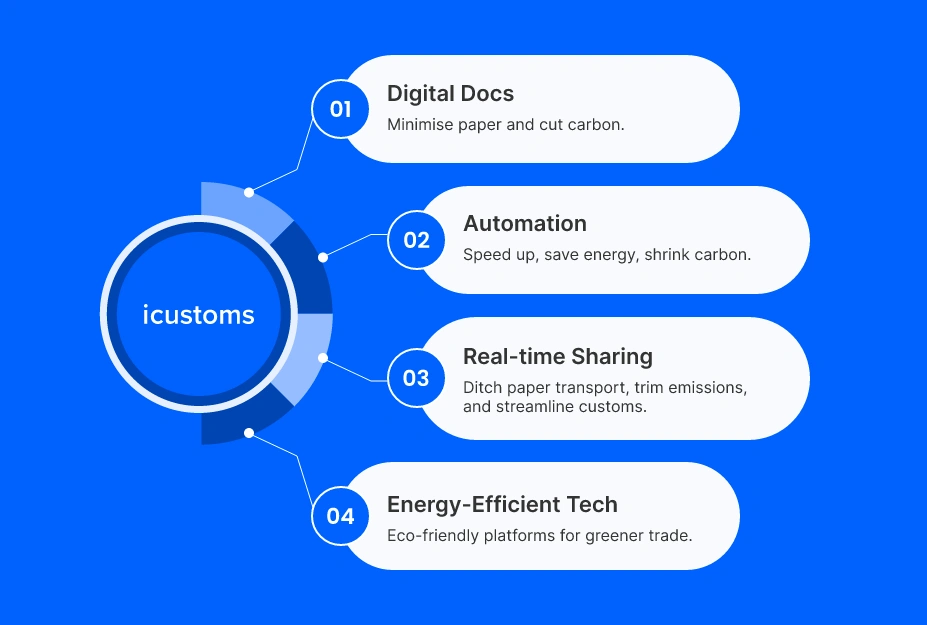Fast & Accurate ENS GB & EU ICS2 Solutions Built for You.
Green Trade Today: Cut Carbon with Paperless Solutions
-
Freya Jane
- Director of Customer's Success
In an increasingly sustainable world, businesses are constantly looking for methods to reduce their environmental impact. One important area in which environmentally friendly actions may have a significant impact is customs declarations. This blog discusses how adopting IDP, i.e., paperless solutions, may have a profound impact, showing how it can expedite customs processes and play a key role in creating a more sustainable and environmentally friendly trade environment.
A study by The World Counts says, “Paper waste is a major component of landfill debris: it makes up roughly 26% of all garbage at landfills.
The carbon footprint of traditional customs procedures
Conventional customs processes, firmly embedded in voluminous documentation, not only impose administrative obstacles but also have a significant negative impact on the environment. This section aims to untangle the intricate web of environmental consequences weaved by traditional customs operations, showing how dependence on paper documents results in significant ecological costs.
The environmental cost of paper production
The making of paper, which requires raw resources from forests, is where the environmental journey starts. This demand for paper leads to deforestation, which exacerbates ecosystem degradation and biodiversity loss and has a domino effect on other environmental issues.
Carbon emissions and transportation
The transportation of paper once it is created has an additional negative environmental impact. Traditional customs documentation systems around the world using trucks, aircraft, and ships increase carbon emissions significantly. This makes a substantial contribution to the overall carbon footprint of customs processes.
Depletion of resources and disposal
Paper’s life cycle extends beyond its manufacture and delivery. Ineffective customs processes frequently result in the destruction of out-of-date documents, which adds to the buildup of trash. This disposal, whether it be recycled or dumped in a landfill, uses more energy and resources and feeds the cycle of resource depletion and environmental stress.
Ineffectiveness and energy use
In addition to obvious environmental costs, paper-based customs procedures have inherent inefficiencies that result in hidden costs. Delays in customs processing lead to higher energy use. Extended processing periods need continuous operation of infrastructure, machinery, and facilities, which increases carbon emissions and highlights the fundamental inefficiencies of conventional customs operations.
The potential of paperless customs solutions
Welcome to the era of paperless customs solutions, a disruptive force in the quest for environmentally friendly trading methods. The digital transformation of customs declarations acts as a lighthouse, directing enterprises towards greater operational efficiency and a lower environmental footprint. Digital technologies provide smooth data transmission, real-time processing, and improved communication among stakeholders.
Ways paperless solutions cut carbon in customs declarations

Electronic documentation
The use of paperless software solutions such as IDP software represents a shift from traditional paper documentation to digital alternatives. Businesses greatly minimise their environmental effect by doing away with the requirement for reams of paper. In addition to preventing deforestation, AI documentation reduces the carbon footprint caused by the transit and manufacture of paper goods.
Automated procedures
The incorporation of automated customs processes brings a transformational approach to business operations. Automation reduces customs delays while also decreasing the energy consumption associated with human operations. This efficiency improvement not only speeds up the customs clearance procedure but also significantly reduces the overall carbon footprint that is linked to lengthy and energy-intensive processing periods.
Making well-informed decisions
Enabling real-time data interchange is one of the distinguishing features of paperless solutions. With this invention, there is no longer a need for the conventional method of physically transporting documents, which results in a major increase in carbon emissions. Businesses can achieve a noticeable decrease in carbon emissions related to document transit while also streamlining their customs operations by facilitating quick communication between pertinent parties.
Energy-efficient platforms
Selecting software platforms and cloud-based solutions is a strategic move towards an energy economy. These contemporary AI document processing platforms emphasise environmental sustainability while outperforming traditional server-based systems. Businesses using paperless solutions actively contribute to a more environmentally friendly trading environment by lowering energy usage in data processing and storage.
Overcoming obstacles and embracing change
Although there may be some early difficulties in switching to paperless customs solutions, the long-term advantages outweigh the effort. In order to promote a shared commitment to sustainability, stakeholders must acknowledge the beneficial effects on the environment and business operations.
Future trends in sustainable trade
Customs processes are expected to adopt novel approaches in the future as the world’s objectives continue to change towards sustainability. Artificial intelligence and blockchain technology, in particular, will be crucial in determining how sustainable trade develops.
The bottom line
The adoption of paperless customs solutions is the first step towards achieving efficient documentation and sustainable commerce. This decision may appear straightforward, but it has a significant impact. Businesses that reduce their reliance on paper and embrace digital alternatives might not only contribute to a more environmentally friendly future but also reap substantial benefits from simplified customs operations.
Ready to revamp your customs processes and lessen your ecological footprint? Explore the iCustoms environment and our IDP software to experience smooth, paperless customs solutions. Make a decisive step in the direction of a more sustainable and greener trading environment. Contact our team of specialists for further information and tailored advice. Together, let’s mould effective, environmentally responsible trading methods for the future.
FAQ's
What types of paperless solutions are available for businesses engaged in international trade?
Businesses engaged in international commerce can choose from a variety of paperless solutions, including electronic documentation platforms and digital trade platforms.
How do paperless solutions help in cutting carbon emissions in the trade industry?
By minimising the need for physical documentation, shipping, and related operations, paperless solutions help the trade sector reduce carbon emissions and create a more efficient and ecologically friendly trading system.
Are paperless solutions secure and compliant with trade regulations?
Paperless solutions use digital signatures and encryption to guarantee the authenticity and integrity of electronic documents, making them safe and compliant with trade laws.
How can businesses measure the environmental impact of adopting paperless practices in trade?
Businesses may assess the environmental effect of being paperless in trade by comparing measures such as reduced paper use, transportation emissions, and overall resource efficiency versus old methods.
You may also like:
Struggling to Extract, Catagorise & Validate Your Documents?
Capture & Upload Data in Seconds with AI & Machine Learning
Subscribe to our Newsletter
About iCustoms
Struggling to Extract, Catagorise & Validate Your Documents?
Capture & Upload Data in Seconds with AI & Machine Learning

